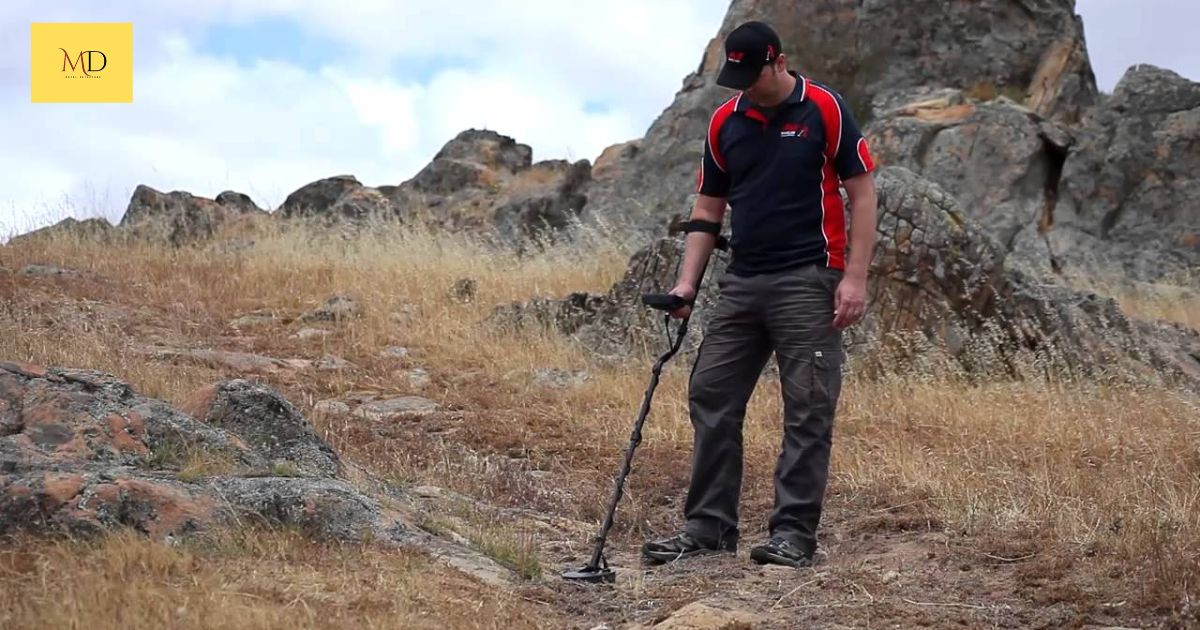Metal detectors are devices that use electromagnetic fields to identify the presence of metallic objects. They consist of a coil that emits a magnetic field and a sensor that detects changes in that field caused by metal. When metal is detected, the device signals with an audible alert or visual display.
Ever wondered if your metal detector can unveil the hidden treasures of gold? Unlock the secrets beneath the surface as we explore the captivating question: “Do all metal detectors detect gold?” Join us on a journey of discovery and find out how you can turn your metal detecting hobby into a golden opportunity.
While many metal detectors are designed to locate various metals, including gold, it’s important to understand the nuances in their capabilities. Factors like the detector’s technology, frequency, and settings play a crucial role in determining its effectiveness in detecting gold.
Gold Detection The Challenge
Unlocking the secrets of gold detection poses a unique challenge in the world of metal detecting. Unlike other metals, gold possesses distinctive properties that can make it elusive to standard detection methods. Its conductivity and size often place it on the edge of detectability, requiring specialised technologies to overcome the challenge.
In the realm of metal detecting, understanding the specific challenges posed by gold detection is crucial. Various factors, such as the type of metal detector technology used, the soil’s mineral content, and the depth at which the gold is buried, play integral roles in determining the success of a detection mission.
The Unique Properties of Gold
Delving into the world of metal detectors unveils a fascinating quest for enthusiasts: the ability to detect gold. The question of whether all metal detectors can uncover this precious metal introduces us to the intricacies of metal detecting technology. From the basics of how metal detectors operate to exploring the unique properties of gold, this article navigates through various factors influencing detection, including the different technologies employed by detectors.
Factors Influencing Detection
The effectiveness of metal detectors in detecting gold is influenced by various factors. One crucial element is the composition of the ground being scanned. Different soil types and mineralization levels can impact the detector’s ability to identify gold signals. Additionally, the size and shape of the gold object play a role, as smaller or oddly shaped pieces may be more challenging to detect.
Exploring Different Metal Detector Technologies
When delving into the realm of metal detecting, understanding the various technologies employed by metal detectors becomes paramount. Two primary types, Very Low Frequency (VLF) and Pulse Induction (PI) detectors, dominate the landscape. VLF detectors operate by emitting a low-frequency magnetic field and are adept at detecting a wide range of metals, including gold.
Additionally, specialty gold detectors cater specifically to the nuances of gold detection. These detectors are finely tuned to the unique properties of gold, often incorporating advanced features and settings to enhance sensitivity to small gold nuggets. Exploring these different technologies empowers enthusiasts to choose the most suitable tool for their metal detecting endeavours, whether it be for a diverse range of metals or a focused pursuit of the elusive gold treasures.
VLF (Very Low Frequency) Detectors
VLF (Very Low Frequency) detectors are a popular and versatile type of metal detector widely used for various purposes, including treasure hunting and relic recovery. These detectors operate by emitting a continuous low-frequency signal into the ground, which interacts with metallic objects. When the signal encounters metal, it induces electrical currents that the detector can detect.
Specialty Gold Detectors
Specialty Gold Detectors are purpose-built devices designed with a laser focus on detecting the elusive and precious metal gold. Unlike general-purpose metal detectors, these specialised tools are equipped with advanced features and specific settings tailored to the unique properties of gold. With enhanced sensitivity to small gold nuggets and improved discrimination capabilities, they excel in gold prospecting scenarios.
Real-world Considerations

In the realm of metal detecting, real-world considerations significantly impact the success of your treasure hunt. One crucial factor is the ground conditions you encounter. Different terrains, from sandy beaches to mineral-rich soil, can affect the accuracy and depth of your metal detector. Understanding how ground composition influences signals is key to optimising your searches.
When venturing into the world of metal detection, it’s essential to consider the environmental factors that might affect your quest for valuable metals. Rain-soaked soil, for example, may alter the conductivity of the ground, impacting the detector’s performance. Being attuned to these real-world considerations ensures that you’re well-prepared to adapt your approach, making your metal detecting adventures not just a hobby, but a skillful pursuit yielding tangible results.
Ground Conditions and Their Impact
In the world of metal detecting, the terrain beneath our feet holds secrets that significantly influence the success of our endeavours. Ground conditions play a pivotal role in determining the accuracy and efficiency of metal detectors. Soil composition, mineralization, and moisture levels are key factors that can either enhance or hinder the detection process. Highly mineralized soil, often rich in iron or other metallic elements.
Depth and Sensitivity Settings
Understanding depth and sensitivity settings is paramount in the world of metal detecting. Depth settings control how deep a metal detector can penetrate the ground to detect objects, influencing the range of discoveries. Sensitivity settings, on the other hand, determine the device’s responsiveness to smaller or deeply buried targets. Striking the right balance between these settings is a skill that can significantly impact the success of your treasure-hunting endeavours
FAQ,S.
What metals can not be detected by a metal detector?
Metal detectors are generally ineffective in detecting non-metallic substances such as plastic, glass, wood, and most organic materials.
Which metal detector is best for finding gold?
The best metal detector for finding gold depends on various factors, including the type of gold prospecting you’re engaging in. VLF (Very Low Frequency) detectors are popular for general-purpose gold hunting, offering sensitivity to small gold nuggets.
Can I find my gold ring with a metal detector?
Yes, you can potentially find your gold ring with a metal detector. Metal detectors are effective in locating various metals, including gold.
Conclusion
In conclusion, the world of metal detecting holds endless possibilities for both enthusiasts and treasure hunters alike. Whether you’re in pursuit of relics, coins, or that cherished gold ring, understanding the intricacies of metal detectors is the key to a successful and rewarding experience. From the unique properties of gold to the diverse technologies employed in metal detectors.
As you embark on your metal detecting journey, remember that the quest goes beyond the mere act of searching; it is a captivating adventure that combines science, technology, and a touch of mystery. By delving into the nuances of depth and sensitivity settings, considering different metal detector technologies, and dispelling common misconceptions, you equip yourself with the knowledge needed to enhance your detecting skills.











